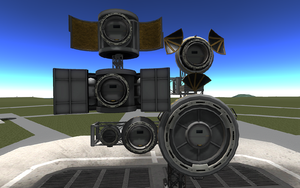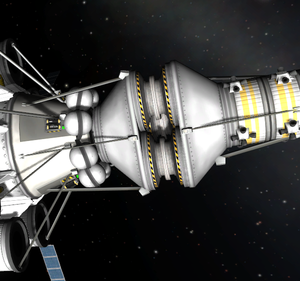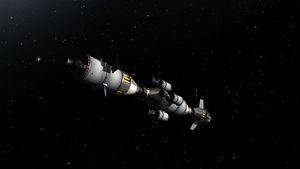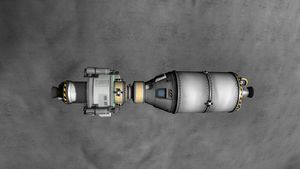Difference between revisions of "Docking"
m (→Small in-game computer systems: -unfortunately both links have been deleted due to the corrupted backups;) |
(+available docking ports;) |
||
| Line 10: | Line 10: | ||
The faintly purple button around the bottom left corner of the screen (just below the green staging button, and above the blue map button) sets your ships into docking mode. In docking mode your main engines are shut off and your normal WASD controls map to RCS translation maneuvers instead. | The faintly purple button around the bottom left corner of the screen (just below the green staging button, and above the blue map button) sets your ships into docking mode. In docking mode your main engines are shut off and your normal WASD controls map to RCS translation maneuvers instead. | ||
| − | To dock with a nearby object (see [[Basic Maneuvers | + | To dock with a nearby object (see [[Basic Maneuvers#Docking / Rendezvous|the basic maneuvers page]] for how to rendezvous with another object in orbit), start by rotating your ships so their docking ports are facing each-other. Remember to toggle any docking-port covers if necessary. Also keep an eye out for how your ships will connect and make sure you won't run into solar panels or other modules on your approach. |
Right click the docking port on your ship and hit "control from here". Now activate docking mode. What is happening now is that docking port will be seen as the "center" of your ship. Your WASD keys will be used for moving sideways (known as "translation") on a plane that is perpendicular with your docking port's direction. Throttle-up (Shift) will approach your target ship by moving forward (specifically, whichever way your docking port is pointing) and throttle-down (Ctrl) will move away. | Right click the docking port on your ship and hit "control from here". Now activate docking mode. What is happening now is that docking port will be seen as the "center" of your ship. Your WASD keys will be used for moving sideways (known as "translation") on a plane that is perpendicular with your docking port's direction. Throttle-up (Shift) will approach your target ship by moving forward (specifically, whichever way your docking port is pointing) and throttle-down (Ctrl) will move away. | ||
| Line 23: | Line 23: | ||
To undock simply right click either of the docking clamps and click undock. | To undock simply right click either of the docking clamps and click undock. | ||
| + | |||
| + | === Docking ports === | ||
| + | There are five docking ports available for different sizes and docking directions. In order to dock two spacecrafts, both must be equipped with docking ports of equal size. When constructing a spacecraft, another part which is not a docking port can be placed on it. That part can then be undocked, but not redocked. | ||
| + | |||
| + | * [[Clamp-O-Tron Jr.]] is the [[radial size|tiny]] port | ||
| + | * [[Clamp-O-Tron Docking Port]] is the small port | ||
| + | * [[Clamp-O-Tron Sr. Docking Port]] is the large port | ||
| + | |||
| + | * [[Clamp-O-Tron Shielded Docking Port]] is the small port which has a cover which needs to be opened first | ||
| + | * [[Inline Clamp-O-Tron]] is the small port located on the side and can be covered | ||
== Multi-port docking == | == Multi-port docking == | ||
Revision as of 23:32, 17 June 2013
Docking was officially introduced in KSP 0.18 and allows separate ships to join into a single entity that is controlled as one and allows the transfer of resources (but not yet Kerbanauts) between connected modules.
To get close enough to even consider docking, you'll need to perform an orbital rendezvous.
Contents
Using the docking controls
The faintly purple button around the bottom left corner of the screen (just below the green staging button, and above the blue map button) sets your ships into docking mode. In docking mode your main engines are shut off and your normal WASD controls map to RCS translation maneuvers instead.
To dock with a nearby object (see the basic maneuvers page for how to rendezvous with another object in orbit), start by rotating your ships so their docking ports are facing each-other. Remember to toggle any docking-port covers if necessary. Also keep an eye out for how your ships will connect and make sure you won't run into solar panels or other modules on your approach.
Right click the docking port on your ship and hit "control from here". Now activate docking mode. What is happening now is that docking port will be seen as the "center" of your ship. Your WASD keys will be used for moving sideways (known as "translation") on a plane that is perpendicular with your docking port's direction. Throttle-up (Shift) will approach your target ship by moving forward (specifically, whichever way your docking port is pointing) and throttle-down (Ctrl) will move away.
Once your docking ports are very close (or touching) they will magnetically clamp to each-other and you will have successfully docked. The tolerance for the clamps is quite generous, however, it can take some time for it to kick in - so once you get your ports in close proximity, just wait a bit before trying to get any closer (and possibly damage your ships).
Note that you don't have to be in docking mode to dock - if you manage to align your docking ports using the regular controls, everything will still work.
While docked, you can transfer resources (fuel, etc) by clicking on a tank, and then alt+right clicking on another target and pressing the desired In/Out switches of the windows that pop up.
As of 0.19.1, Kerbanauts have to be transferred manually using EVAs.
To undock simply right click either of the docking clamps and click undock.
Docking ports
There are five docking ports available for different sizes and docking directions. In order to dock two spacecrafts, both must be equipped with docking ports of equal size. When constructing a spacecraft, another part which is not a docking port can be placed on it. That part can then be undocked, but not redocked.
- Clamp-O-Tron Jr. is the tiny port
- Clamp-O-Tron Docking Port is the small port
- Clamp-O-Tron Sr. Docking Port is the large port
- Clamp-O-Tron Shielded Docking Port is the small port which has a cover which needs to be opened first
- Inline Clamp-O-Tron is the small port located on the side and can be covered
Multi-port docking
Unfortunately, docking ports are not very rigid. This makes crafts which consist of multiple large sections very difficult to control. To mitigate this problem, you can use bi- or tri-couplers to mount multiple docking ports. The resulting multi-part connection is a lot more stable. Unfortunately docking these crafts is even more difficult than docking with a single-port connection, because now you also have to take care of the rotation of your craft. Otherwise it can happen that only one port connects. Should this happen, undock your craft and try again. Sometimes when using tri-couplers, it can happen that even though the orientation is perfect, only two ports are actually connected. You can tell by right-clicking the ports. When none of two ports has an "undock" option, they are not actually connected. This problem can be solved by going to the space center and reloading the ship.
Additionally, it is recommended to control a multi-part craft from the command pod closest to the center of mass of the whole contraption. In that case the direction on the nav-ball is affected the least by the ends of the craft wobbling around.
Possibilities for docking
Docking gives you some great new abilities.
In-orbit refueling
So you've built a huge, kick-ass spaceship, but it needs so much fuel to start that its fuel tanks are empty before it even left Kerbins orbit? No problem, just send some tankers into orbit, dock them to your ship, pump the fuel to the ships tanks and deorbit the empty tankers.
When you do this frequently, you could consider to build a Space Station with a large fuel depot and have each interplanetary mission do a tank-stop there.
In-orbit spacecraft assembly
There is a limit of how large your rockets can be, and most of them will be used just to get into orbit. So what can be done to build even larger crafts for more exciting interplantary missions? Launch the individual components into orbit on separate rockets, and then dock them together into one giant space ship.
The cancelled Constellation program by NASA was planning to use this method for manned missions to moon and mars[1].
Note though that currently (as of 0.19.1) docking connectors are a bit wobbly, so ships from too many too heavy components will be hard to control. Docking ports can even rip off when put under too much stress. This problem can be mitigated by using multiple docking ports on bi- or tri-couplers (see above). A mod which offers a different workaround for this problem is the Quantum Strut mod.
Detachable landing crafts
This method was used during the human moon landings [2], and it can be equally useful for the Kerbal. When you do a landing mission and have the intention of getting back to Kerbin, don't take all the fuel for the return flight to the surface of whatever planet you are visiting. Undock a lander with just enough fuel to get to the surface and back, and redock it with the return stage when it's back in orbit. You can save a lot of fuel that way, because the lander doesn't need to carry all the return fuel to the surface and back into orbit.
Small in-game computer systems
Docking Ports can also be used to create limited orbital computers. [3]




